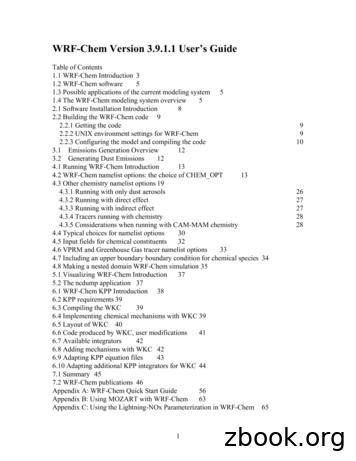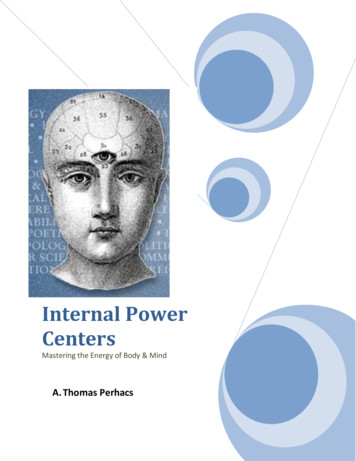CHEM 4113/6171: Advanced Inorganic Chemistry (II)
CHEM 4113/6171: Advanced Inorganic Chemistry (II)Principles and Applications of Inorganic Chemistryin Current Energy ResearchSpring 2013 and alternating springSyllabus and LogisticsInstructor Contact Information:Prof. Jake D. SoperPhone: 404 894 4022Office: Molecular Science & Engineering (MoSE) 1100HOffice Hours: Mon 3 4, Wed 3 4, and by appointmentEmail: jake.soper@chemistry.gatech.eduPlease be sure the put CHEM 4113 or CHEM 6171 in the subject line of all email.Course Schedule:1. Lecture/Discussion10:05 10:55 AM Mon, Wed, Fri in MoSE 12222. ExamsMidterm Exam: Fri March 1Final Exam: 11:30 AM 2:20 PM Wed May 1Course Materials:Required BooksThere is no required textbook for this course.Reading assignments will come from supplied references and/or literature packets on T Square. An introductoryinorganic chemistry text, such as Shriver & Atkins Inorganic Chemistry, will likely be useful for background readingand reference. Many are available in the library, along with other helpful resources, including the reserve texts listedbelow.Reserve Books1. Advanced Inorganic Chemistry, 6th ed. by F. A. Cotton, G. Wilkinson, C. A. Murillo, and M. Bochmann2. Chemical Applications of Group Theory, 3rd ed. by F. A. Cotton3. Symmetry and Spectroscopy: An Introduction to Vibrational and Electronic Spectroscopy, by D. C. Harris and M. D.
Bertolucci4. Physical Methods for Chemists, 2nd ed. by R. S. Drago5. Chemistry of the Elements, 2nd ed. by N. N. Greenwood and A. Earnshaw (available electronically via the GTLibrary)Course Policies and Expectations:Class Communication and T SquareAll supplied course materials will be available via the web at T Square. These will include homework assignments,references and literature packets, and lecture slides.You will occasionally receive class information via email from me to your Georgia Tech account. Someannouncements may not be communicated in class. Therefore, it is important for you to check your email regularly.Email from me will contain CHEM 4113/6171 in the subject line. If you use an alternative email address it is yourresponsibility to have messages from your Georgia Tech account forwarded to the alternative address.The best way to contact me is via email. My email address is jake.soper@chemistry.gatech.edu. For anycommunication concerning the class, please add CHEM 4113 or CHEM 6171 to the subject line, and be sure toidentify yourself by name in the message. I will try to answer all email in a timely fashion (24 48 h).Please make me aware of any issues that may arise. I've found that more communication makes for a better courseand a more enjoyable semester. I aim to be very available. Feel free to contact me in person, by email, or by a noteleft my mailbox.LectureComputers and cell phones are not permitted during lecture.Slides used in class will be posted to the Resources section of the CHEM 4113/6171 T Square site. I will not postcopies of my lecture notes. If you miss a lecture, it is your responsbility to copy lecture notes from a classmate.Class attendence and participation are mandatory. Everyone benefits if you come to class prepared to be anactive participant in the learning process. To encourage class participation, problem sets based on readingassignments from current literature will be due appoximately once a week. Homework policies are provided below.Reading/Problem SetsProblem sets will be due approximately once per week. The problem sets are based on reading assignments fromcurrent literature, and are designed to test comprehension and stimulate critical review.Problem sets will be due in class, at the beginning of class. Unless you make me aware of exceptionalcircumstance before the assignment is due, I will not accept late homework or homework turned in outside of theclassroom. Problem sets will comprise 20% of your overall class grade. Problem sets will be graded on a scale of 0 5points. Points will be deducted for failing to make a good attempt at all of the assigned questions. I also reserve theright to deduct points for unwillingness to participate in classroom discussions of the homework questions.At the end of the semester, your total homework points earned will be normalized to 20. For example: If a total of 13problem sets are assigned over the course of the semester, then there are 65 possible points. If you earn 55 ofthese points, you have 55/65 0.85 of the possible homework points (i.e. 17/20).You are encouraged to work together with your classmates on the problem sets, but each student isrequired to write up and turn in solutions in their own words. You are allowed to ask me questions. You arefree to use any online or library resources in researching your answers (including SciFinder and the primaryliterature), but all submissions must be written in your own words. If your answer derives from another source, citethis in your homework. Any plagarism, including copying from classmates, will be considered a violation of theGeorgia Tech Academic Honor Code.Midterm ExamOne midterm exam will be given during the semester. I reserve the right to offer a take home midterm exam in lieu ofan in class exam, but notice of a take home exam will be given at least 2 weeks prior to the exam date. Exams will
focus on topics covered in lecture up to that point. All in class exams will be closed book. No electronic devices willbe allowed. All necessary resources will be provided. Take home exams will specify the allowed resources.Final ExamA two hour fifty minute final exam is scheduled for Wednesday May 1 at 11:30 AM, as set by the Georgia TechRegistrar's office. Do not make travel arrangmenets that preclude taking the final exam at this time. All students,except those with a conflict as defined by the Registrar, must take the final exam in the designated exam period. Agrade of F will be assigned if a student misses the final exam without a documented excuse.I reserve the option of offering a take home final exam in lieu of an in class exam, but notice of a take home finalexam will be given at least 2 weeks prior to the exam date. All exam rules above apply to the final exam.Grade ChangesRequest for re grades must be made in writing within one week of the date that the graded exam or problem set isreturned.Make Up ExamsMake up exams will only be given for valid excused absences. An excused absence is defined by the Institute'sGeneral Catalog, Rules and Regulations, Section 4B3. If the Dean of Students determines that a student has a validexcuse for missing an exam, a make up exam will be scheduled immediately. Arrangements for a make up examdue to a scheduled Institute activity must be made at least one week prior to the exam.Proposal/Review ProjectEach student will submit and present a written proposal and critical review project to the class in April. The project willbe worth 15% of your overall class grade. Detailed instructions will be provided at a future date.Course GradesMidterm Exam30 points (30%)Final Exam35 points (35%)Problem Sets20 points (20%)Proposal/Review Project15 points (15%)TOTAL100 pointsGrading ScaleAExcellent90.1 100%90.1 100 pointsBGood80.1 90.0%80.1 90.0 pointsCAverage70.1 80.0%70.1 80.0 pointsDFair60.1 70.0%60.1 70.0 pointsFFailing 60.1% 60.1 pointsI reserve the right to adjust this grading scale, but the cut offs can only be lowered so that any adjustments will onlybenefit students. Adjustments are not guaranteed, and any that are made will be done at the end of the semesterafter all grades are calculated.Studens enrolled in CHEM 4113 and 6171 will be given the same exams and problem sets, and graded indentically,however final grades will be independently calculated for the two classes. This means a different grading scalemay be applied to CHEM 4113 vs. CHEM 6171. I expect the mean grade in both classes to be a B, unless a classis exceptionally good or exceptionally bad.Learning DisabilitiesStudent learning disabilities documented through ADAPTS will be honored as detailed to the instructor. Please informboth me within the first week of the course or as soon as possible.
Academic HonestyIt is expected that all students are aware of their individual responsibilities under the Georgia Tech Academic HonorCode, which will be strictly adhered to in this class. All violations of the Honor Code will be reported to the Office ofStudent Affairs. For questions involving any Academic Honor Code issues, please consult me, the teachingassistants, or honor.gatech.edu.Course Schedule and Aims:AimsThe class will bounce between applications of inorganic chemistry in current energy research and fundamentalprinciples of coordination chemistry and reaction mechanisms relevant to these topics. Ideally one informs the otherand builds an understanding of the theories and mechanisms governing energy conversion and storage in chemistryand biology. Core concepts will be taught by examinations of recent primary research literature in the areas listedbelow.2013 Lecture ScheduleBelow is a tentative outline/ordering of topics I'm planning to cover in this course. This list may be revised—andtopics may be added or dropped—as we progress through the semester. As the course develops, I will regularlyupdate this online schedule in an attempt to stay current.1.0 Powering the Planet1.1 Chemical challenges and opportunities in energy research2.0 Metal–Ligand Multiple Bonds2.1 Electronic structures of tetragonal oxo–metal complexes2.1.1 the oxo wall2.2 Oxo–metal complexes in non tetragonal ligand fields2.2.1 "violations" of the oxo wall2.2.2 reactive oxo intermediates2.2.3 electronic designs for O–O bond formation3.0 Water Splitting, Part I3.1 Water oxidation3.1.1 thermodynamics3.1.2 water oxidation catalyts and mechanisms for O–O bond formation3.1.2.1 enzymatic3.1.2.2 homogeneous3.1.2.3 heterogeneous4.0 Proton Coupled Electron Transfer (PCET)4.0.1 definitions and elementary steps4.1 Theory and mechanisms4.1.1 thermochemistry4.1.2 theoretical treatments4.1.3 linear free energy relationships and PCET kinetics5.0 Water Splitting (Part II), Hydrogen Production5.0.1 Thermodynamics of H2 activation5.1 Hydrogenases5.2 Homogeneous catalysts5.2.1 hydrogenase models5.2.2 small molecule catalysts and photocatalysts5.3 Heterogeneous catalysts and electrode materials6.0 PCET in Energy Conversion and Storage
6.1 O2 reduction6.1.1 enzymatic6.1.2 synthetic catalysts and fuel cells6.2 CO2 reduction6.2.1 thermodynamics of CO2 reduction6.2.2 mechanisms: enzymatic CO2 reduction, homogeneous catalysis and electrocatalysis6.3 N2 fixation6.4 PCET at metal–oxide nanoparticle surfaces7.0 Metal–Organic Framework (MOF) Materials7.17.27.37.47.5Synthesis and geometric principlesStructure–property relationshipsSelective catalysisCH4/H2 storageCO2 capture and selective gas adsorption
inorganic chemistry text, such as Shriver & Atkins Inorganic Chemistry, will likely be useful for background reading and reference. Many are available in the library, along with other helpful resources, including the reserve texts listed . Chemical Applications of Group Theory, 3rd ed. by F. A. Cotton 3. .
CHEM 350B Topics in Chemistry 7.5 454.95 CHEM 351 Chemicals Big and Small: Nano- 15 909.90 CHEM 352 Advanced Concepts in Chemistry 15 909.90 CHEM 352A Advanced Concepts in Chemistry 7.5 454.95 CHEM 352B Advanced Concepts in Chemistry 7.5 454.95 CHEM 360 Contemporary Green Chemistry 15 909.90 CHEM 380 Materials Chemistry 15 909.90
Housecroft. Inorganic Chemistry 3rd. Edition solution manuals or . Housecroft,. Catherine E. Housecroft is. chem 341 inorganic chemistry final exam, fall 2000 name: - inorganic chemistry final . inorganic chemistry catherine e housecroft solutions manual - [full online]. 9 Nov 2018 . inorganic third edition pdf -.
3 Chem 104A, UC, Berkeley Chem 104A, UC, Berkeley Chemistry 104A Inorganic Chemistry: Reference Books Cotton, Wilkinson, and Gaus, Basic Inorganic Chemistry, Wiley, 1995 Cotton, Chemical Applications of Group Theory, Wiley, 1990 Douglas, McDaniel, and Alexander, Concepts and Models of Inorganic Chemistry, Wiley, 1994
CHEM 31X. Chemical Principles 4 CHEM 33. Structure and Reactivity 4 CHEM 35. Organic Monofunctional Compounds 4 CHEM 36. Organic Chemistry Laboratory I 3 MATH 41, 42, 51. Calculus, Linear Equations 5 5 5 SECOND YEAR CHEM 130. Organic Chemistry Laboratory II 4 CHEM 131. Organic Polyfunctional Compounds y3 CHEM 134.
Supplementary Text: "Shriver and Atkins’ Inorganic Chemistry” 6th Edition, authored by P. Atkins, T. Overton, J. Rourke, M. Weller, and F. Armstrong Relationship to Other Courses and Pre-Requisite Knowledge: The prerequisite for CHEM 5263/CHEM 4333 is CHEM 3353 or equivalents and 3 hours of physical chemistry.
CHEM 110 Chemistry of the Living World 15 4,736.85 CHEM 120 Chemistry of Material World 15 4,736.85 CHEM 150 Concepts in Chemistry 15 4,736.85 CHEM 200 Special Topic 15 4,736.85 CHEM 251 Structure and Spectroscopy 15 4,736.85 CHEM 252 Properties and Analysis of Mat 15 4,736.85
WRF-Chem Version 3.9.1.1 User’s Guide Table of Contents 1.1 WRF-Chem Introduction3 1.2 WRF-Chem software 5 1.3 Possible applications of the current modeling system 5 1.4 The WRF-Chem modeling system overview 5 2.1 Software Installation Introduction 8 2.2 Building the WRF-Chem code 9 2.2.1 Getting the code 9
MaMa Internal Power Centers Mastering the Energy of Body & Mind A. Thomas Perhacs























